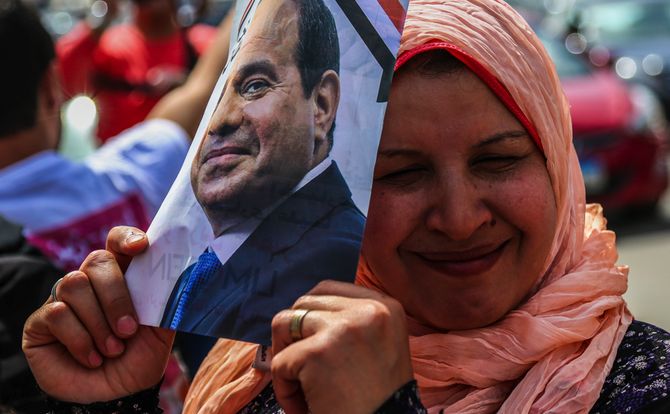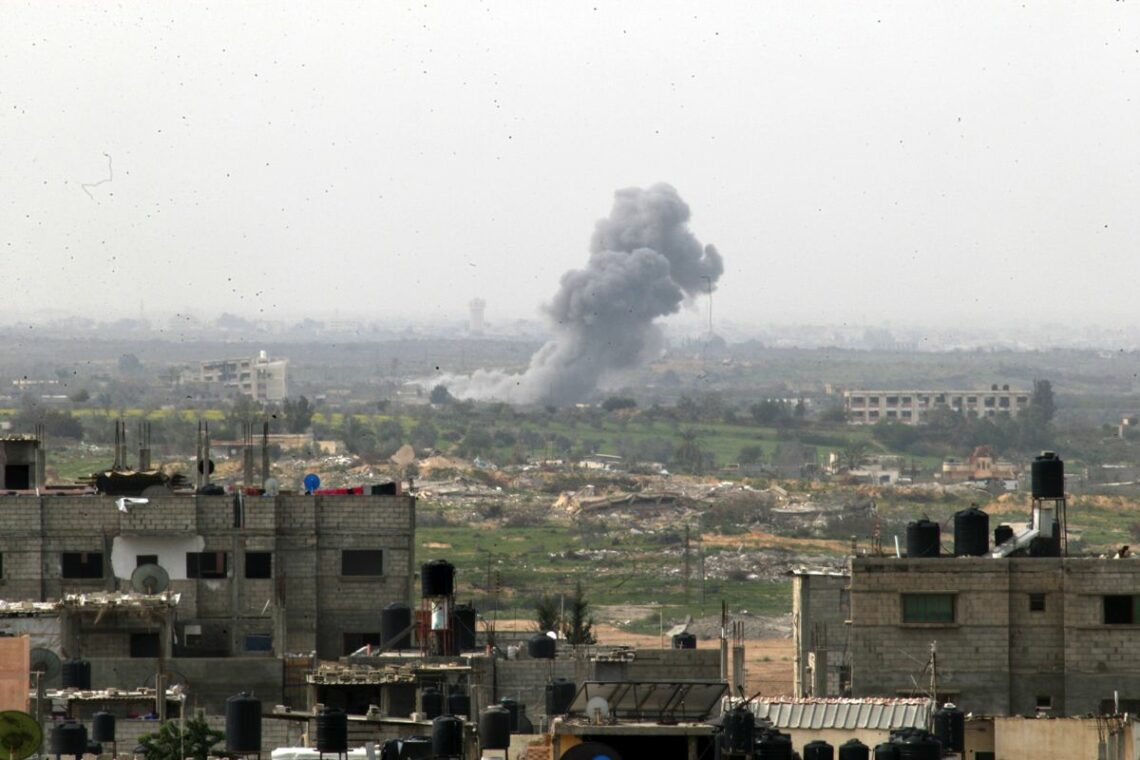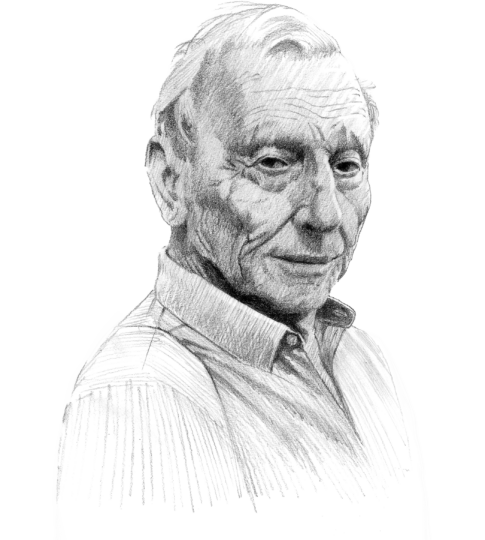Proud and jittery as El-Sisi begins second term
With the Middle East in turmoil, the Arab world’s most populous nation and its biggest army are nowhere to be found. Egyptian President Abdel-Fattah El-Sisi believes the path to national greatness begins at home, with economic development – not foreign entanglements.

In a nutshell
- Egypt’s top priority and achievement under President El-Sisi is economic reform
- Efforts to eradicate jihadi terrorism in the Sinai have been less successful
- New threats from the south and east could still drag Egypt into regional conflicts
Egyptians love to call their country “Oum Eddinia” – “Mother of the World.” With a population nearing 100 million and the largest Arab army in the Middle East, Egypt should be playing a central role in that troubled region. President Abdel-Fattah El-Sisi has chosen another path.
He believes economic development is the key to sustainable national greatness. While striving to achieve his goal, he made the strategic decision to focus on immediate and proximate security threats to his country and not let himself get involved in military conflicts beyond his borders. Reelected to another four-year term in March 2018 with 97 percent of the vote, he is not expected to deviate from this path.
Western media were quick to claim that the election was rigged. Potential rivals were prevented from running by means fair or foul; the lone opposing candidate had previously supported Mr. El-Sisi and barely made a dent on the results. Yet no one disputes the fact that the incumbent president would have won anyway. One could say that this is the way things have always been done in Egypt. Western democracy is alien to this ancient land. The new constitution stipulates, as did the previous one, that Islamic law is the primary source of legislation.
The president rules with an iron fist, stifling protest and jailing journalists. He is in the process of forming a new political party ahead of next year’s parliamentary elections to ensure broad support. He has his hands full with the ongoing insurgency in the Sinai Peninsula and does not want to be distracted with political squabbles.
Despite being depleted and weakened, the jihadi group can still mount devastating attacks.
The vast counterterrorist operation launched in February to eliminate the local branch of the Islamic State is not bringing the desired results. Two hundred terrorists were killed and thousands of “suspects” were arrested, but most were later released. Communications and command centers were destroyed, caches of arms and explosives were discovered, vehicles and motorcycles were seized. Yet, despite being depleted and weakened, the jihadi group can still mount devastating attacks and take a heavy toll on civilian life in northern Sinai.
Fighting terror
A 5-kilometer-wide buffer zone has been established along the border with the Gaza Strip and hundreds of families were forcibly relocated. There is a night curfew in several sectors. Supplies of food and medicine are erratic; schools and colleges have been closed to prevent terror attacks. Local populations grudgingly support the government, but they are increasingly critical of its lack of success.
Egypt’s efforts to curb the flow of contraband weapons from Libya (plundered from Gaddaffi’s vast stockpiles after his downfall) are seconded by General Khalifa Haftar, the commander of the National Libyan army and strongman in the eastern half of the country, who also happens to be a staunch ally of the Egyptian president.
Fighting terror was a major factor in Cairo’s efforts to isolate the Gaza Strip. The local affiliate in Sinai of Daesh, or Islamic State, used the enclave as a rear base where the wounded could be sent for treatment and militants could train and experiment with new weapons. Hamas needed Daesh to facilitate the transit of weapons, ammunition and sometimes men smuggled through the Libyan border; the terror organization also controlled tunnels into Gaza.
President El-Sisi has made remarkable progress on the issue that matters most: the economy.
There was thus a mutually profitable cooperation between these two jihadi movements, even though they have wholly different objectives. The Egyptian army targeted and eliminated most of the tunnels. To further deter Hamas from helping Daesh, Cairo keeps the Rafah border crossing closed, opening it for two or three days each month to let people and goods leave or enter the Strip. This is a powerful tool, since a lengthy closure could lead to rioting in Gaza. Hamas ostensibly cut off ties with Daesh – which promptly sealed smuggling tunnels which were still working.
Reform pace
Despite the unsettled situation in the Sinai Peninsula, President El-Sisi has made remarkable progress on the issue that matters most: the economy. According to forecasts by the International Monetary Fund (IMF), economic growth for 2018/19 should reach 5.2 percent, the best full-year performance in a decade. This has been achieved by heavy investments in infrastructure and free-market reforms, since the tourist industry has still not recovered from its sharp downturn following the 2011 Arab Spring uprisings. The IMF has helped by granting Egypt a $12 billion loan at a very low interest, to be disbursed over three years, subject to five reviews of the required reforms.
Egypt has successfully passed three such Article IV reviews, the latest, in May 2018, giving a positive outlook. So far, President El-Sisi has faithfully adhered to the reform program, floating the Egyptian pound, introducing VAT, cancelling subsidies and liberalizing trade to allow competition. The measures are designed ultimately to create more jobs and reduce unemployment among Egypt’s fast-growing young population. Cairo has also granted offshore gas exploration concessions to international groups, which led to the discovery in 2015 of the mammoth Zohr offshore field, the largest in the Mediterranean Sea, by Italian energy giant Eni SpA. Production started in record time – in December 2017, just 28 months after the discovery – and Egypt is well on the way to becoming a major hub of the liquefied natural gas trade through its two existing LNG plants.
With rising prices and fewer subsidies, public support for the president fell from around 90 percent to 60-70 percent.
The rapid pace of reform, while welcome and long overdue, had its drawbacks. Inflation jumped to 30 percent, in part due to the temporary effect of floating the Egyptian pound, before easing to 20 percent. It has now stabilized and is expected to reach 13 percent in 2018/19. Yet the country’s fast-growing internal debt – equivalent to 97 percent of GDP – is a potential threat to economic stability, especially as the IMF estimates that Egypt’s external debt has risen to $86.9 billion (or even $100 billion, according to Fitch Ratings).
With rising prices and fewer subsidies, public support for President El-Sisi fell from around 90 percent to some 60-70 percent – still an enviable result. More important, there was no popular protest movement. Egyptians seemed to understand that there was no alternative. Instead, they preferred to hope that the bright future the government was promising would eventually materialize.
The Egyptian president’s mantra, when tasked with his country’s poor showing in the field of human rights, is that no Western-type democracy can arise in the lands of Islam without a strong economy, a decent standard of living and educational reforms to instill a different set of values.
Difficult neighbors
But Egypt is not operating in a vacuum. In its immediate neighborhood, Cairo is trying to achieve a reconciliation between Hamas and the Palestinian Authority, thus far with limited success. Hamas would be happy to see the Authority take over the Gazan economy and the care and feeding of its population – but it is not ready to divest itself of its military wing, the Ezzedine Al-Quassam Brigades, which spearhead its fight against Israel. The Palestinian Authority president, Mahmoud Abbas, also known as Abu Mazen, naturally objects. Because of the stalemate, Egypt is powerless to act in the Israeli-Palestinian conflict and can only reiterate that there can be no solution without the creation of a Palestinian state, with East Jerusalem as its capital.

Relations between Egypt and some of its Red Sea neighbors are fast deteriorating. The days of so-called brotherhood between Nile Valley countries are gone. Following its capture of Egyptian-made armored vehicles (probably delivered via Eritrea), Sudan accused Egypt of assisting the Darfur rebels; the Khartoum government has also been demanding that Cairo return the Hala’ib Triangle, a strip of land on their common border. Sudan also opposed the transfer of Sanafir and Tiran islands from Egypt to Saudi Arabia and protested to the UN.
The border tensions with Sudan have hurt Egypt in an even more important dispute over water from the Nile river. The African countries upriver are demanding an increase in the water quotas they were originally allocated under British colonial rule – over strenuous Egyptian objections. Sudan, which itself is blessed with abundant rainfall, tends to back these claims. It is also supporting Ethiopia’s construction of the “Grand Ethiopian Renaissance Dam” on a tributary of the Blue Nile. The project could become Africa’s largest hydroelectric producer, but could severely curtail Egypt’s water supply – 95 percent of which is drawn from the Nile. The situation is so dire that the possibility of it degenerating into an armed conflict cannot be ignored.
Red Sea worries
In the meantime, Turkey is stealthily entrenching itself in the Red Sea. In 2017, it set up a large military base near the Somali capital Mogadishu “to train Somali troops.” Last December, Khartoum agreed to transfer to Turkey for an indefinite period the Red Sea island of Suakin, with both sides hinting at military cooperation. Facing the island, which sits athwart the sea lanes to the Suez Canal, is the Sudanese port of Suakin, which operates a daily ferry route to the Saudi Arabian port of Jeddah. These developments look particularly ominous in Cairo, since Turkey is a strong supporter of the Muslim Brotherhood and broke off diplomatic relations with Egypt in 2013 after the ouster of former President Mohammed Morsi.
Another hot spot is Yemen, where the Iran-backed Houthi rebels have taken over the port of Hodeida, threatening the southern part of the Red Sea and the approaches to the Suez Canal. As a result, this body of water – once a Saudi-Egyptian zone of influence – is now being encroached upon by two powers aspiring to regional hegemony: Turkey and Iran.
Egypt is buying weapons to upgrade its military potential, but it’s not clear how it will pay for the hardware.
Not surprisingly, Egypt is buying weapons to upgrade its military potential. Over the past two years, it has bought three Type 209 diesel-electric submarines from Germany, two Mistral-class helicopter assault ships, three frigates and 36 Rafale fighter planes from France, along with 50 MiG-29 fighters and 15 Ka-52 attack helicopters from Russia. On its future shopping list are heavy-lift cargo planes, drones, radar systems and air defense missiles. There is probably more to come. How Egypt will pay for this hardware is unclear, but one can assume it will be given extremely generous terms.
Wiggle room
In this troubled neighborhood, Egypt’s one true ally is Israel, which has provided high-level cooperation in combating jihadi terrorists in the Sinai.
Facing threats on several fronts, Egypt refused to get involved in the Syrian crisis, even though its national interest would seem to dictate resistance to Shia Iran’s expansion and jihadi rebels backed by Saudi Arabia and the Gulf states. A complicating factor was hostility from U.S. President Barack Obama’s administration, which refused to accept President Morsi’s ouster. American military assistance to Egypt was suspended just when it was needed most to fight Islamic terror. President El-Sisi was forced to turn to Russia.
Vladimir Putin was happy to oblige – with sales of military equipment and specialized training for Egyptian paratroopers. Moscow also agreed to supply four nuclear power plants, with long-term financing at low interest, and invest in other economic projects. But all this came at a price. Cairo had to line up with Moscow behind Syrian President Bashar al-Assad. It voted with Russia on Security Council resolutions concerning Syria, and tried without success to persuade several Syrian rebel groups to accept the Astana process. Egypt also expressed concern about the recent bombing of Syrian targets by the U.S., France and the United Kingdom; it turned down an American proposal to send troops to Syria that had been accepted readily by Saudi Arabia.
In the long run, President El-Sisi knows full well that he will need U.S. investments and technology to develop his economy. But for the time being, he must meet his country’s immediate needs and maneuver as best he can between Moscow and Washington.
Threat scenarios
With the Middle East ever more unstable and torn by regional and great power rivalries, President El-Sisi will stick to his cautious approach. But some matters cannot wait. The Ethiopian dam issue will come to a boil at some point in 2019, when the project is completed. The Ethiopians will then have to decide whether to fill the reservoir immediately or gradually, and whether its water will be used solely to generate electricity or diverted for agricultural use. Above all, they will have to weigh the pros and cons of cutting a deal with Egypt.
In case of a confrontation, President El-Sisi could order his air force to destroy the dam from the air. This is his most likely military option, since it would avoid the risky commitment of land forces over difficult terrain.
Another threat scenario is Turkish interference in Suez-bound maritime traffic from its new strongholds in the Red Sea. But this appears unlikely at a time when Ankara is already engaged in Syria, Iraq and Qatar. More Turkish troops were recently sent to the small Gulf emirate following a blockade imposed by Saudi Arabia, Egypt, the UAE and Bahrain.
On the home front, Mr. El-Sisi will keep pushing for economic reforms to contend with the high birth rate – 1 million new mouths to feed every six months. In the long term, he must find a way to persuade the Islamic establishment to approve some form of birth control (the clerics’ intransigent opposition was one reason President Anwar Sadat’s efforts to limit the birth rate failed in the 1970s and 1980s). To relieve demographic pressure and produce a tangible increase in living standards, Egypt needs average annual economic growth of 7 percent for a decade. That may not be impossible, but it is a very tall order.
The Sinai insurgency will continue to flicker, though Daesh’s defeat in Syria and Iraq should cut off an important source of financing. A significant military presence will have to be maintained in the northern Sinai until the insurgency is fully quashed, however. As for Hamas, it is hard to envision a quick solution. Unless Israel moves to crush the organization (which does not seem likely at this point), it will remain a threat to Egypt.
Coping with these challenges will be difficult enough without the possibility of a major regional conflict. If the conflagration is large enough, even a leader as astute as President El-Sisi may not be able to steer clear.






